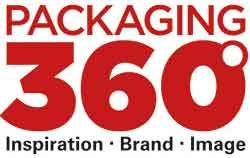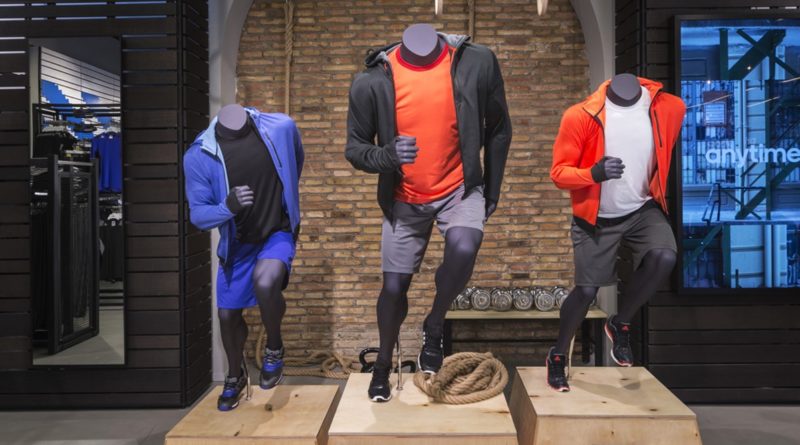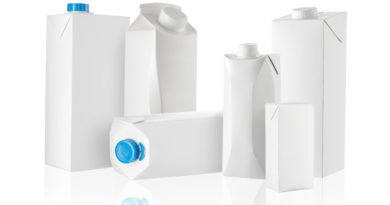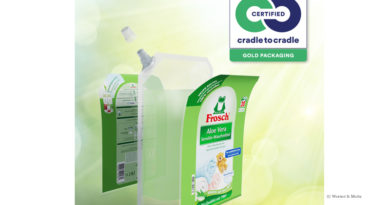Clothing made from PET bottles
They still have a niche existence, but more and more fashion companies are producing clothing from used PET bottles.
Fashion that is not only a visual eye-catcher, but also makes an ecological statement: consumers like to buy for their well-being – and for their conscience too. More and more fashion manufacturers are advertising ecologically sustainable textiles, including fashion chains such as H&M or C&A. The sporting goods manufacturer adidas produces shoes from recycled plastic waste, the fashion brand Fossil offers bags made from PET waste. But there are also some retailers and manufacturers who sell only chic eco-fashion and advertise with recycled garments.
Avocadostore, by its own account Germany’s largest online marketplace for Eco Fashion & Green Lifestyle, sells solely products that meet at least one of ten sustainability criteria such as „recyclable/recycled“, explains Katja Meincke of Avocadostore. She says that the criterion acknowledges products for which it has already been taken into account at the time of manufacture how the corresponding product can be used further at the end of the product cycle. Recycled plastic bottles are often recycled into polyester yarns or other forms of plastic. But truck tarpaulins, car tyres, product packagings, hoses, belts, sheet metal and other raw materials are also transformed into completely new products or product components through recycling. Areas of application can be shoe soles or bags. Products that are themselves easy to recycle, because for example they are completely compostable, are recyclable. The more easily and more visibly the components can be separated, the better this is for further use.
From bottle to fleece jacket
Plastic bottles are made of the plastic polyethylene terephthalate (PET). The basic material polyester is obtained from oil, a raw material that is becoming increasingly scarce and therefore more expensive. To make clothing, the bottles are washed, sorted and processed into PET flakes – this form is cheaper for transport. The resulting secondary raw material is ground and heated. The molten plastic is then drawn into threads in a spray nozzle process, and these threads are then woven into fibres. The material obtained is for example processed into synthetic woven fur, better known as „fleece“. However, other textiles with a high polyamide and low cotton content can also be made from the plastic flakes. Polyester fibres are particularly suitable for sportswear or functional clothing because they can easily transport moisture away from the body. China is the market leader in textile recycling. Dealers buy the used PET bottles from supermarkets in Germany and ship them as PET flakes to China.
Polyester fibre made from recycled plastic
One of the players in the eco-fashion market is the Spanish company Ecoalf. In order to obtain the recycled raw materials, the fashion company cooperates with an international network and frees oceans from plastic waste. According to Ecoalf, 250 boats a day bring a total of 1.3 tonnes of marine waste ashore for Ecoalf. The fishermen along the Spanish coast also participate by handing in their old nets at Ecoalf’s collection points instead of throwing them into the sea, explains the company. Several production steps follow before new fabric results from the old fishing nets and PET bottles. According to the company, Ecoalf has recycled 70 million plastic bottles to date. „The plastic bottles are collected and processed into plastic flakes in several cleaning and crushing steps. These are spun via a mechanical process into raw polyester fibres, which are then manipulated to obtain the final quality. This remanufactured thread is used, for example, to make fabrics, linen, labels or belts“.
ADVERTISEMENT
 At FachPack you can experience the latest trends in the sector of recycling and sustainable plastics and gain a fascinating overview of packaging machines, labelling and marking technology, solutions for intralogistics and packaging logistics. More information can be found here.
At FachPack you can experience the latest trends in the sector of recycling and sustainable plastics and gain a fascinating overview of packaging machines, labelling and marking technology, solutions for intralogistics and packaging logistics. More information can be found here.Ecoalf used innovative materials such as Primaloft for the production of sustainable down jackets. This ensures maximum warmth with minimum weight and smallest packing size. The proportion of certified down has been reduced to a minimum by adding recycled PET. Nevertheless, clothing made of synthetic fibres should be disposed of correctly after a long service life. A light men’s down jacket is made from 80 PET bottles, for example. Ecoalf was established in 2009: „I was frustrated by the excessive use of the world’s natural resources and the amount of waste produced by the industrialised countries. The aim was to produce the first fashion series that would use recycled materials to achieve the same quality, modern design and technical progress as the best non-recycled products. I wanted to show that it is not necessary to continue wasting the planet’s natural resources,“ said company founder Javier Goveneche.
The clothing manufacturer Dawn from Cologne also sells sustainable fashion. The polyester fibres used are manufactured by the Repreve brand ofMessrs. Unifi. They consist exclusively of used, recycled PET bottles. The bottles are cleaned, shredded and processed into fine „chips“, explains Ines Rust of Dawn. These are melted and spun into a thread, then processed into yarns and later into fabrics. „We coat the polyester fibre with organic cotton and spandex. After weaving, we get a perfect stretch jeans material,“ they say.




